Augustine Wetta's Blog, page 2
April 1, 2023
Sinners in the Hands of (an Angry) God
Sermon to the Saint Louis Priory School, Friday, Fifth Week of Lent
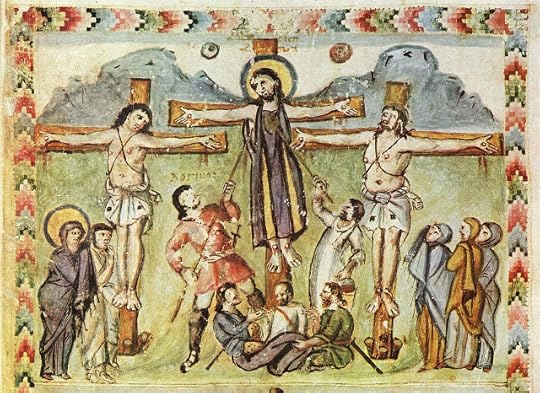
Praised be Jesus Christ...now and forever!
I want to start off this refelction with a story. I’m sure you’re familiar with it. It’s a story from the life of a saint, although his name escapes me at the moment. He was born into a prosperous and loving family, raised in a supportive home, was popular with his peers, excelled in his classes—you know the saint I’m talking about, right?—he was good-looking and well educated. He grew up, got married, had several loving children and died at a happy old age. You know who I’m talking about, right? Right? No! Of course you don’t. Because that is the story of no saint EVER. You just won’t find a saint in the church’s calendar who lived without suffering. In fact, you won’t find any human person in the history of the world who lived without suffering. You’ll find plenty of examples of people who tried hard to avoid suffering. You’ll find lots of excuses for non-saints and non-heroes--stories about people who would have been heroes if everyone around them hadn’t been such jerks. But I challenge you to find a man in the history books who had a good, easy stress-free life, filled with happiness and success.
Think what our history books would be like if our heroes had made excuses rather than face their suffering: I can imagine Abraham Lincoln saying to his grandchildren, well, I would have won the war if my generals had just done what I told them. Or imagine Winston Churchill whining to his wife that England just had to surrender to the Nazis because really, what chance did they have of winning when his own cabinet wouldn’t support him. I can imagine Alexander the Great. No, we’ll call him “Alexander the Mediocre” explaining that he never conquered Greece because, well, the Greeks were really, really good soldiers. And I can imagine Jesus saying to the Sanhedrin, “Oh, fine. You don’t want my help, then I give up. You guys sort all this out yourself. I’m gonna take a nap.” But that’s not how heroes do things. It’s not the way saints do things. And it’s not the way God expects you to do things.
Because no one can keep you from being a saint—not your teachers, not your friends, not your boss, not your enemies…in fact, the harder they try, the greater saint you’re likely to be—provided you are willing to face your suffering.
A few days ago, I was complaining to a friend of mine. She’s a Dominican nun named Sister Jane Dominic. (No stranger to suffering, by the way.) We’re working on a book together, and I was a little late getting one of my drafts in, so I was making excuses---whining to her about how—you know—it’s tough being a monk. Our numbers are down and the Church is in crisis, and the culture is against us and I’ve got too much on my plate and I can’t seem to get enough sleep and blah blah blah blah. And when I was done, she sighed and she said to me, “Well, you know, Father, it would have been nice if Jesus had told us ‘Pick up your marshmallow and follow me.’ But that isn’t what he said, is it?” I’ve got to admit, she has a point.
I have another friend in the religion business who likes to say, “You can’t expect to be more successful at your job than Jesus was. And look what they did to him”.
The readings for next two weeks of Lent are going to be pretty dark:
from Jeremiah:
"Terror on every side! Denounce! let us denounce him! All those who were my friends are on the watch for any mistake I make.”
To the psalms:
The waves of death surged round about me, the destroying floods overwhelmed me; The cords of the nether world enmeshed me, the snares of death overtook me.
Or even this, from the Gospel of John:
I have shown you many good works from my Father. For which of these are you trying to stone me?
And those are just from today’s readings. We haven’t even gotten to the part where they capture, torture, beat, bully, and kill Jesus. (Yeah. Sorry, guys. Spoiler alert. Jesus dies at the end.)
But wait.
That’s not the end, is it? You know the real spoiler; that’s coming too. He rises from the dead. But there’s no resurrection without a death and a burial. There’s no heaven without a purgation. And, as Mother Teresa said, love, to be true, must hurt.
Two weeks ago, I got to preach at the Senior Retreat. I’d been reading a sermon by an eighteenth-century Puritan name Jonathan Edwards. The Puritans were a little… well… puritanical. And they were pretty big on hellfire and brimstone. And I was reading these sermons, and they’re actually pretty entertaining; so I decided to adapt one of them for my talk to the seniors.
“The Bow of God’s Wrath is bent,” I bellowed, “and the Arrow made ready on the String, and Justice bends the Arrow at your Heart, and strains the Bow, and it is nothing—nothing but the mere Pleasure of God--and that of an angry God, without any Obligation at all--that keeps the Arrow one Moment from being made drunk with your Blood. O Sinner! Consider the fearful Danger you are in! The Wrath of almighty GOD is now undoubtedly hanging over a great number of this very Congregation: So flee this wicked world: Be quick! Run for your Lives! Don’t look back! Escape to the Mountain, lest you be consumed.”
Yeah. I got pretty much the same reaction out of the seniors. Because, come on. We don’t really believe in Hell anymore, do we? Isn’t Jonathan Edwards just a little over-the-top? God’s really, really, really nice. He wouldn’t send anyone to Hell…would He?
I’ll tell you this much: for all their many faults, the Puritans at least knew what they were being saved from. And we may not remember Jonathan Edwards for his sermons on God’s Saving Mercy, but it’s rather hard to have a sense of that saving mercy when we don’t know what God is saving us from.
I’ve been reading another book this Lent by a black Southern Baptist minister. It’s called “The Cross and the Lynching Tree.” There’s some stuff in it that I find problematic, but he makes one observation that has changed the way I think about Jesus’ death, and it is this: Jesus was lynched. An angry, lawless mob, executed him in a demeaning and disgusting manner while the government turned a blind eye. It was horrifying and it was dehumanizing. And it took those early Christians three hundred years before they started making sculptures and paintings of Jesus’ death. So if you’re wondering what the soldiers looked like when they laughed at Jesus on the cross, have a look at some of the photographs of lynchings. They’re not hard to find; there are lots of them. The photographs were sold as postcards to tourists. Look at the faces in these photographs. Folks like you and me. Laughing. Children with big smiles pointing at charred corpses hanging from trees. And if you think it’s a little early in the morning for such a graphic description, I’d remind you that we have sculptures of such an execution in every room of our school. Look at the crucifix. And ask yourself: was that really necessary?
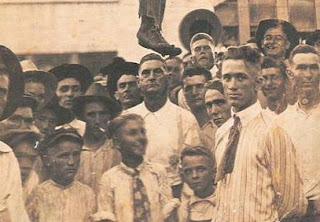
You have fifty days of celebration coming up, during which you will be invited to reflect on Christ’s glorious resurrection. But for the next two weeks, you will be asked to meditate on His passion, His torture, and His death. If you do this with a sincere heart, then I promise your own suffering will lighten a little. Your suffering will begin to mean something, because your suffering will be united with Christ’s. This is how you will find the courage to be saints. And this is how your suffering will save the world.
In the name of the Father…
October 16, 2022
The Golden Compass -- a Catholic defense
Several years ago, while studying Milton at Oxford, I decided to hike out to Philip Pullman’s house and ask him to sign my book. I’d read The Golden Compass that spring, and was so taken with it, I immediately started teaching it to my Seventh Grade English students. In my opinion, no Fantasy writer since Tolkein had written with such literary integrity as this Oxford Atheist. I thought it a shame to be so close to someone like that and not try to meet him.
The catch is that I am a Roman Catholic Benedictine monk. I joined Saint Louis Abbey in 1996 at the age of 25, and have been here ever since, teaching English and Classics in our school. It was my abbot, in fact, who suggested I go to Oxford in the first place. At the same time, however, a monk away from his monastery is in a precarious sort of position, so when I hiked the seven miles to Cumnor and knocked on Mr. Pullman’s door—in full habit, and carrying my psalter in one hand, The Golden Compass in the other—part of me expected a demon to answer (or a “daemon”); I had read reviews of his books which condemned them for being “anti-Christian”, “anti-God”, “anti-Catholic”, and, most notably, “Anti-Harry Potter.” For this last attribute, I could almost overlook the first four. Sitting in his living room with his dogs in a heap at his feet, I found him charming, gracious, and kind.
The simple truth is, I never found Pullman’s books offensive, though I fully expected to. I had heard that his book was permeated by anti-Catholicism, but the “Church” he portrayed in his fantasy series bore so little resemblance to the Church I love, that it was actually difficult for me to relate to my own experience. Frankly, I was willing to grant that, in a parallel universe where the Church granted preemptory absolution and had a “Pope John Calvin I,” certain things might indeed go horribly wrong for the Magesterium. I was well aware that Mr. Pullman’s theological views were crucial to his writing, that he had no love for organized religion, and that he despised C.S. Lewis; but in the end, I felt that—in spite of himself—he had created a true and beautiful work of art. In short, he had not allowed his theological agenda to interfere with his vision. Unlike Dan Brown, who lies to his readers, and Tim LaHaye who patronizes them, Pullman treats his audience with respect and honesty. He doesn’t pretend to write historical fiction, and he doesn’t sacrifice artistic integrity to rhetoric.
Now, I teach 7th Grade English, and over the course of the past few years, I’ve been talked into reading dozens of books in the so-called “Fantasy” genre—from the vapid and offensive “Spell for Chameleon” to the dull and unimaginative “Pendragon”—and all of them were lifeless, puerile, watered-down Tolkeins. Here, suddenly, in the writings of an avowed atheist, I found myself drawn into a unique world of fantasy, where bears built their souls out of steel, and Tartars in dirigibles fought air battles with witches. But what I found most surprising of all were the parts of the book NOT original to Pullman. As he explained to me over tea that Saturday afternoon, much of the theological roots of his fantasy world came straight from the poems of John Milton and William Blake. Thus we find angels at war with God, souls freed from the underworld by a prophesied savior, and (as I explained to Mr. Pullman) for me the most poignant image, a young person who gives up human love and affection for the sake of building a heaven on earth.
Upon Mr. Pullman’s recommendation, I wound up reading William Blake’s “Marriage of Heaven and Hell.” Frankly, I’m a little embarrassed that I’d never read it before, but I’m equally embarrassed to admit that, in my opinion, Blake sounds like a total wacko. But then, so do Ezekiel, and St. Francis, and John of the Cross, and all the really great mystics. Having read Blake, I have a much keener understanding of what Mr. Pullman was trying to tell me that week in his living room. Above all, he deplores what he perceives to be the Christian division between body and soul, with its inevitable scorn of bodily functions and desires.
But then, Blake was raised on a strict diet of Calvinist rhetoric, and indoctrinated by the Swedenborgian sect, so he can’t really be blamed for rebelling against a form of Christianity that had divorced itself from a eucharistic vision of the world. Catholics are much more reluctant to draw a strict line between body and soul—between “this world” and “the next.” Christ himself, after all, preached that the Kingdom of God was “at hand,” and for the Catholic, the Eucharistic liturgy is literally “heaven on earth.” So those cultures which preserved a eucharistic vision of reality (Roman Catholic, Eastern Catholic, Orthodox…) never did subscribed to the false dichotomy which so offended Blake. The French, the Italians, the Greeks, the Spanish…these are peoples who have always been famously comfortable with their sexuality and with their bodies—famously at ease with the bodily pleasures: food and wine, passion and dance. And this attitude comes out of—rather than in spite of—their religious culture: a culture which feeds BOTH body AND soul at the Eucharist. Only in Calvinist/Lutheran cultures does one find this prudish and desperate repression of bodily desires—an attitude which, even to this day, we label “Puritanical.”
I wonder how Blake’s theology might have changed had he apprenticed himself to, say, St. John Bosco (the juggler, magician, acrobat and educator) rather than Swedenborg—if he had read St. Irenaeus (“The Glory of God is man fully alive”) rather than St. Augustine. And I wonder if Philip Pullman’s understanding of the Church might have been different had he spent more time with Gerard Manley-Hopkins and less with William Blake.
If anything, J.R.R. Tolkein’s reliance on pagan iconography actually had the effect of reviving certain forms of paganism in the Twentieth Century. Similarly, I expect Pullman’s reliance on Catholic imagery might have the opposite effect of that which he originally intended. Insofar as it is art, it will be venerated. Insofar as it is rhetoric, it will be forgotten. And our children may indeed be rescued—at least temporarily—from the largely vapid world of “fantasy literature.”
In the end, because Mr. Pullman’s understanding of the Church is faulty, his rhetoric falls flat; and because he relies so heavily on Christian iconography, the world he has created remains fundamentally Christian. But could he ever have avoided it? “The seed of the divine,” says Justin Martyr, “is present in all things true and beautiful;” so Mr. Pullman, in creating something beautiful, has enshrined the truth in his novel, even if, occasionally, that truth is obscured by some personal ignorance. In the end, one must admire him for having the courage to not allow his religious agenda a pride of place above his artistic integrity.
--Fr. Augustine Wetta, O.S.B.
I received a Christmas card from Pullman. I was proud of the “Catholic” reaction—more lay than Episcopal. He can get mean. His theology is a little used.
It’s worth noting that, as the trilogy progresses, the anti-religious “message” becomes more explicit. By the end of the book, his rhetoric takes over—few of my students actually make it to the end of the third book, though many of them try.
September 11, 2022
The Splendor of Poop...And Other Theological Truths I Learned from my Three-Year-Old Niece
 Georgia then... I’m not a fan of children. It’s no secret. They creep me out. They always seem to be watching me, and never have anything constructive to offer about their observances. They are largely uneducated, they’re selfish, their hygiene is deplorable, and their conversation lacks depth. I once had a thirty-minute discourse with my two-year-old niece during which her only response—in fact, the only word she used during the entire conversation—was “Fork.” And little babies are even worse. Imagine a six-foot, physically mature baby. It would literally tear you to pieces for a cheerio.
Georgia then... I’m not a fan of children. It’s no secret. They creep me out. They always seem to be watching me, and never have anything constructive to offer about their observances. They are largely uneducated, they’re selfish, their hygiene is deplorable, and their conversation lacks depth. I once had a thirty-minute discourse with my two-year-old niece during which her only response—in fact, the only word she used during the entire conversation—was “Fork.” And little babies are even worse. Imagine a six-foot, physically mature baby. It would literally tear you to pieces for a cheerio. But my niece, Georgia, was the exception. (I say “was” because she’s much older now.) But as a baby she was no less selfish and no better educated than most of the other small human children I’ve known. Mysteriously, however, I found her more tolerable. Besides that, being related to her, there was just no avoiding some social interaction. At three or so, the conversation began to attain a certain depth, but it tended to revolve around unicorns, which I don’t find all that interesting. One Christmas, I was obliged to spend an entire hour playing “American Girl Dolls” with Georgia (and for the record, I cannot imagine a less enriching, less intellectually stimulating pastime than having tea with a fake human. There wasn’t even any actual tea—and even that took twenty minutes to arrive at the table. Still, I persevered.
The thing is, tea—even invisible tea—has a certain stimulative effect on my digestive system, so about half way through, I had to excuse myself.
“Gussy, where you going?” she asked. (For the record, there are only three people in the world allowed to address me as Gussy, and they are all related to me.)
“I’m going to duck in to the bathroom for a moment,” I answered. “I hope that’s okay.”
“Fine,” she said. “But it’s gonna be stinky.”
She said this with such gravitas that I felt obliged to thank her for the warning.
When I returned a few minutes later, I found Georgia deep in thought. She seemed almost troubled.
“Is everything okay?” I asked.
“Gussy,” she said after a bit more silent reflection, “did Jesus poop?”
It wasn’t anything I had given much thought. Presumably, he had a perfectly efficient digestive system. But then again, the food he consumed was harvested from a fallen world—not to mention that certain fibers and whatnot, even and especially in a perfect digestive tract, would have to be expelled.
“Yes, Georgia,” I said, “I believe he did.”
At this her face brightened. In fact, the whole room seemed to get a little brighter. She grinned at me, shook her doll in the air and shouted, “Jesus pooped!”
She spent the rest of the Christmas season discoursing on this theological wonder to her parents, her friends, her relatives…even complete strangers. On her way out of church the next Sunday, she was still spreading the good news.
Because, you see, at that time in her life, Georgia was only really good at one thing. And it was a revelation to her that, thanks to the incarnation, she could be like Christ when she did it.
And she really did have the scriptures to back her up. After all, Saint Paul himself said, “Everything. You do, do for the glory of God.”
You may remember that Martin Luther used the analogy of a dunghill covered by snow to illustrate his theology of humanity’s utter depravity. We’re all basically manure, he said, but Jesus hides this from God’s aight by covering us with the snow of his grace, so that when he looks down on us, all he sees is the purity of the snow. And that is dead wrong. It’s wrong because it does not acknowledge the fundamental goodness of God’s creation.
Our identity, in other words, is in our goodness—NOT in our sinfulness. What’s more, the eucharist itself ensures that our flesh is imbued with divine dignity. “The cup of blessing that we bless, it is a participation in the Blood of Christ! The bread that we break, it is a participation in the Body of Christ!
We call the story we read this morning “The Parable of the Prodigal Son.” And isn’t that just typical us to identify the main character by his worse attribute. But you can be sure the father in the story does not know him this way. When the prodigal son returns from his journey covered in filth, the father recognizes him immediately—recognizes him from a long way off—as “this son of mine” and “your brother.”
Over the summer, a friend told me about an encounter he had at the University where he is campus minister. He was confronted by a representative of the LGBT community who announced that he identified as female and demanded to be treated as such. “Fine” said my friend, “but that goes both ways, doesn’t it? You have to treat me the way I identify, don’t you?” His interlocutor grudgingly agreed that he would. “Fine then,” said my friend, “I identify as your brother.” And the two hugged it out, then went their separate ways.
To be sure, we live in a culture that insists on finding ugliness and conflict in everything. But this isn’t something new. Our job as Christians is now and always has been to return with confidence to the Father in the sure and certain hope that he will recognize us as his sons and daughters. Then to recognize that same sonship in our brothers and sisters.
 ...and now.
...and now.
July 24, 2022
Our Father
Saint Luke, the evangelist, spends more time on Jesus' prayer than any other Gospel writer; and in today's reading, he hones in on the core of that teaching: a communal declaration of faith, an exhortation to relentless prayer, and the assurance that God will answer.
But it all begins with a request from his followers. The disciples notice that Jesus has this special way of praying, and they say to him, “Teach us how to pray like that. Teach us how to pray like you do.” Jesus’ answer is a seven-stage dialogue of love: seven petitions from the Son to the Father which we, in turn, are invited to share in the Spirit.
And so we enter into the Trinity by using the very words Jesus himself would use when he prayed…the words he continues to use in his prayer through us. The whole thing can be summed up in two words: OUR FATHER. When the Christian prays, it is not the petition of a slave to his Lord or a servant to his master—it is not, fundamentally, “centering” or “mindful”, it is not an “affirmation” or a “mantra” it isn’t an attempt to attain a higher consciousness or personal growth…in fact, to focus on the personal relationship is to miss the point entirely. The “Our” in the “Our Father” guarantees that this will not merely be a personal relationship with God. It is an intimate prayer of perfect love, spoken as part of community that is drawn into the relationship of an infinitely loving Father and a perfectly selfless and singularly humble Son. When we speak the words of the Our Father, we are drawn into that relationship, like-like flotsam sucked into a tornado of love (I’ll find better analogy later); my point is that this prayer has a weight, a focus, an attraction, and a gravity all its own--an irresistible pull that, by its very nature draws us toward its center, which is both within us and utterly out of our reach.
It's depths are theologically infinite. It was Saint Augustine who pointed out that, of the seven petitions of the Our Father, the central petition, “give us our daily bread,” matches the central of the seven beatitudes: blessed are those who hunger and thirst; which matches the central of the seven virtues, which is fortitude; which matches the central sacrament of the Christian Faith, which is, of course, the EUCHARIST.
“So then the Eucharist is our daily bread;” he wrote, “but let us receive it in such a way that we are not only refreshed in our bodies, but in our souls. For the virtue which we aquire here is unity, that gathered together into His body, and made His members, we may be what we receive. Then will it be indeed our daily bread.
By uttering the words ‘Our Father’, the Christian enters into the filial love of God’s own son, and in consuming him is consumed by him. I’ll say it again: the eucharist is the only food that consumes us when we eat it. “I do not, therefore, regard the bread and wine as simply bread and wine;” wrote saint Cyril of Jerusalem, “for they are, according to the Master’s declaration, the body and blood of Christ. Even though the senses suggest to you the other, let faith make you firm. Do not judge in this matter by taste, but be fully assured by faith, never doubting that you have been deemed worthy of the very body and blood of Christ…partake of that bread as something spiritual, and put a cheerful face on your soul" (ibid., 22:6, 9).
 During my travels over the last few months, I’ve discovered some new saints. And although all the saints share a devotion to the Holy Eucharist, I’m particularly drawn to the misfits, the failures, and the losers. Foremost among those losers are Saint Drogo of Sebourg and Saint Mark Ti Tiensiong. Saint Mark was addicted to opium, and his parish priest wouldn’t allow him into the church, so he sat outside the doors and would peak in every day and watch the mass from outside. Since his pastor told him addiction was a mortal sin, and he knew he wasn’t ever going to quit, he resolved to be martyred—which he was.
During my travels over the last few months, I’ve discovered some new saints. And although all the saints share a devotion to the Holy Eucharist, I’m particularly drawn to the misfits, the failures, and the losers. Foremost among those losers are Saint Drogo of Sebourg and Saint Mark Ti Tiensiong. Saint Mark was addicted to opium, and his parish priest wouldn’t allow him into the church, so he sat outside the doors and would peak in every day and watch the mass from outside. Since his pastor told him addiction was a mortal sin, and he knew he wasn’t ever going to quit, he resolved to be martyred—which he was.
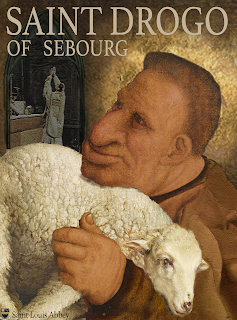
Saint Drogo has a longer, more complex story, but you get a certain sense of him from his patronage. Saint Drogo of Sebourg is the patron saint of ugly People, def people, gall stones, hernias, intestinal blockages and ruptures, nausea, insanity, mental illness, mute people, deaf people, and orphans. This poor guy couldn’t catch a break…. What’s more, like Saint Mark, he was forbidden to enter the Church because, apparently, he scared the children. So he dug a hole in the wall of the church and built a shack on the other side, where he would sit and watch the holy sacrifice being offered. He also happens to be the patron saint of coffee, because, at the end of each day, he would comfort himself by drinking a bowl of warm water.
(FYI…I’ve made holy cards of both saints which you can find at the exits this morning.)
“Eat Christ, then;” writes Saint Augustine, “for, though eaten, He yet lives, for when slain He rose from the dead. Nor do we divide Him into parts when we eat Him: though indeed this is done in the Sacrament, as the faithful well know when they eat the Flesh of Christ, for each receives his part, hence are those parts called graces. Yet though thus eaten in parts He remains whole and entire; eaten in parts in the Sacrament, He remains whole and entire in Heaven. {Mai 129, 1; cf. Sermon 131; on p.65}
In the name of the Father…
March 27, 2022
LAETARE!
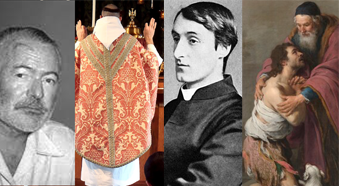
Today is “Laetare Sunday.” On this day, priests wear rose-colored vestments, and our liturgy begins with a Latin introit commanding us to rejoice. “Laetare!” we sing. Lent is half-way over.
So. This morning’s sermon starts with a riddle: What do Gerard Manly Hopkins, Earnest Hemingway, Prostitutes and pink vestments have in common? To be honest, I don’t know the answer to this riddle. It’s just that I started writing this sermon four times, kept getting distracted, and then finally, fell asleep. So what I’ve got here are four ideas with nothing to connect them except, perhaps, the parable of the Prodigal Son. Your job this morning will be to draw some sort of meaning from it, and then convey that meaning to me after mass so that I’ll know what I said.
Thought #1:
While I was looking for sermons to plagiarize, I ran across a poem of Gerard Manly Hopkins. Apparently, he wrote this sonnet while he was struggling through a seven-year bout of depression.
'My own heart’ it’s called. And it’s very short, so I’ll read it to you now:
My own heart let me more have pity on; let
Me live to my sad self hereafter kind,
Charitable; not live this tormented mind
With this tormented mind tormenting yet.
I cast for comfort I can no more get
By groping round my comfortless, than blind
Eyes in their dark can day or thirst can find
Thirst's all-in-all in all a world of wet.
Soul, self; come, poor Jackself, I do advise
You, jaded, let be; call off thoughts awhile
Elsewhere; leave comfort root-room; let joy size
At God knows when to God knows what; whose smile
's not wrung, see you; unforeseen times rather — as skies
Betweenpie mountains — lights a lovely mile.
I don’t actually understand most of that poem, but I have a sense that it’s what we’re doing here today: We’re calling off sad thoughts for awhile so that we can let God’s smile light the skies.
Thought #2:
Earnest Hemingway wrote a short story in 1936 entitled “Capitol of the World” which he begins with the following anecdote: “There is a story they tell in Madrid,” he writes, “about a father who came there in search of his wayward son, and not knowing where to look, took out an advertisement in the personals of the paper that said: PACO MEET ME AT HOTEL MONTANA, NOON TUESDAY. ALL IS FORGIVEN. PAPA and how a squadron of police had to be called out to disperse the eight hundred young men who answered the advertisement.. For Madrid is full of boys named Paco.” I can’t stop thinking about those eight hundred Pacos, all longing to be reunited with their fathers. All those prodigal sons…
Thought #3:
What’s the deal with the prostitutes in this parable? When the prodigal son’s older brother complains about his father’s generosity, he says, “when that son of yours returns who swallowed up your property with prostitutes, for him you slaughter the fattened calf.” Where did the prostitutes come from? There’s nothing in the story about prostitutes. They are purely the construct of the older son’s imagination. He couldn’t possibly know what his younger brother did with the money; but we do know what the older brother imagined his brother was doing with that money. Must have spent some good amount of time fantasizing about it. Shame on him.
Thought #4:
My fourth and last thought is this:
Every Lent, the monks of Saint Louis Abbey resolve to make three devotions: to give something up, to do something extra, and to read a book. Well, we’re half-way through Lent, and I have come to the sad realization that I may never give up sugar, I may never be early for Vespers, and I may never make it past page seventeen of my Lenten book. In short, my Lent has been a failure.
But not today! Because today is Laetare Sunday—Rejoice Sunday—and on this Sunday, we are commanded to celebrate. We’re half way through Lent.
Laetare Jerusalem et conventum facite omnes qui diligitis eam;
Rejoice, O Jerusalem; and gather round, all you who love her!
Everyone gets to celebrate today, even the prodigal son. Everyone gets to take a break from their Lenten fast, even the self-righteous older brother. Everyone gets to rejoice today, even if that means taking a break from failure. And all the Pacos in the world are reunited with their fathers, in the Name of the Father, the Son, and the Holy Spirit.
January 16, 2022
Be Prepared
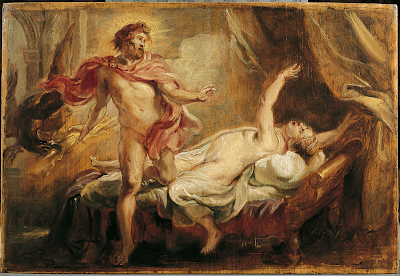 Praised be Jesus Christ now and forever.
Praised be Jesus Christ now and forever. A few years ago, I was reading with my students the story of the birth of Dionysus. Persephone, the legend goes, was impregnated by Zeus and asked to see him in his true form. But a finite creature cannot look upon and eternal being and live…so the mere sight of a Zeus caused Persephone to explode—then and there, on the spot. One of my students asked me why we didn’t explode when we received the Eucharist. I told him I didn’t know…but it couldn’t hurt to be prepared.
In a few minutes, in this very church, I am going to work the greatest miracle in the history of the world. I know how that sounds, so maybe a better way of saying it would be that I, in persona Christi, will work this miracle. Or that Christ will work this miracle through me. But whichever way you want to say it, an astonishing thing will take place here today. Just a few minutes from now, and a few feet from here, the Creator of the universe will appear to us, and we will be invited to approach the altar, and take him in our hands. If we dare. There are some who argue—and convincingly—that we shouldn’t dare to walk up and grab the Eucharist; as though it were a theater ticket or a drive-through order. There are others who argue, and convincingly, that the human hand makes a worthy throne for such a humble king. But either way, we should be prepared.
In 2018 (that’s 2 BC…before Caronavirus), I visited the tower of London with my family. We stood in line for an hour and a half to see the Crown Jewels. An hour and a half! First we were issued tickets, then we sat through a documentary video, then we were ushered through a winding series of velvet, roped corridors past silver and gold vessels, suits of armor, lavish and costly outfits of fur, satin, velvet, and woven gold…until at last, we were granted a brief glimpse of the crown through bullet-proof glass and over the shoulders of heavily armed guards. All that just to see the queen’s crown!
And there is something infinitely more precious here.
We should be prepared.
We should be trembling.
Mobs of Christians should be fighting for a glimpse of this miracle.
So. Where is everybody? Is this really the best we have to offer?
In 2020, our bishops decided to lock the doors of every church. They forbade us—well, they forbade you—from witnessing this miracle in person. Were we outraged? Were we scandalized? There were riots, I remember, but not over that. (Don’t get me wrong. I don’t blame the bishops. They too were acting on the very best medical advice.) But…how many letters did they receive, I wonder, begging them to have courage; to trust that we’d rather die than be deprived of this miracle. I don’t remember hearing about the outrage; but then, I was busy hiding in the cloister, sterilizing countertops and door knobs.
What would you give to have been there at Cana when Jesus worked his first miracle—to stand in the presence of the Queen of Heaven? What would you give to have been there on that first Holy Thursday night? Or to have stood at the foot of the cross. You can. You’ve been invited. You’re here.
Nations shall behold your vindication,
and all the kings your glory;
you shall be called by a new name
pronounced by the mouth of the LORD.
You shall be a glorious crown in the hand of the LORD,
a royal crown held by your God.
Be prepared.
In the name of the Father…
December 10, 2021
Mary, Dread of Demons
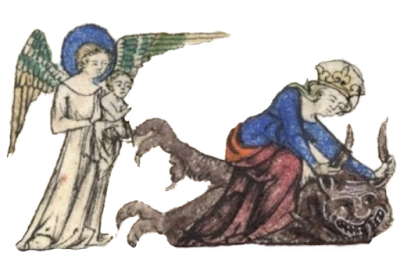 On Wednesday, we celebrated the Feast of the Immaculate Conception. Not to be confused, by the way, with the Virgin Birth—people are always doing that. The doctrine of the Virgin Birth teaches that Mary conceived Jesus without losing her virginity. The doctrine of the Immaculate Conception teaches that Mary herself was born free of original sin—that she was, as the angel Gabriel said to her “full of grace”—no room for sin in her. On December 12, we celebrate the Feast of Our Lady of Guadalupe. And today, we celebrate the Memorial of Our Lady of Loreto. What she was doing in Loreto, I really have no idea, but in my opinion, any excuse to celebrate our Lady will do because she is such a central and powerful figure in the Church.
On Wednesday, we celebrated the Feast of the Immaculate Conception. Not to be confused, by the way, with the Virgin Birth—people are always doing that. The doctrine of the Virgin Birth teaches that Mary conceived Jesus without losing her virginity. The doctrine of the Immaculate Conception teaches that Mary herself was born free of original sin—that she was, as the angel Gabriel said to her “full of grace”—no room for sin in her. On December 12, we celebrate the Feast of Our Lady of Guadalupe. And today, we celebrate the Memorial of Our Lady of Loreto. What she was doing in Loreto, I really have no idea, but in my opinion, any excuse to celebrate our Lady will do because she is such a central and powerful figure in the Church.We often hear Our Lady praised with terms like gentle, loving, merciful, and even sorrowful. And these are all beautiful metaphors of her perfect love for us and for her son. But--gentle and loving though she is, Mary is no push-over. Her Immaculate Conception guarantees that she will hate evil—and hate it with a perfect hate. She stares down Satan himself. In ancient Greece, the early Christians use to depict Mary with the same iconography as Athena Parthenos, the warrior goddess of wisdom, bearing the storm shield and shaking her spear at Death Itself. Mary goes to war for us. And Satan is terrified!
Surely over the next few days of story of the birth of Jesus—how Joseph heard that Mary was pregnant, and was about to divorce her when the angel showed up..so on and so forth. I used to think that Joseph wanted to divorce Mary because he was ashamed of her. But how could any man possibly be ashamed of a woman like that? No, if you read the passage closely, you will find that there is no evidence that Joseph doubts his wife’s fidelity. Instead, we are told only that he is righteous. And we can tell from the angel’s words that he is also afraid. Note that the angel doesn’t say “don’t be ashamed to take Mary as your wife.” behold, the angel of the Lord appeared to him in a dream and said, “Joseph, son of David, do not be afraid to take Mary your wife into your home.
In an instant, he realizes that this isn’t just a great woman he’s marrying. This is the new Ark of the covenant—a treasure so holy no mortal man may touch it. And he is humbled. (Remember that bizarre story from the second book of Samuel where Uzzah, the son of Abinadab sees that the ark is tipping over and reaches out to steady it—and is struck dead!) That story is in the bible for a reason. The ark, the locus of God’s covenant—is sacred. Mightily, frighteningly sacred. So sacred, that no mortal man may under any circumstances dare touch it. And Mary is the new Ark.
A few summers ago, when I went home to visit my family, we watched a really awful movie starring Macaulay Culkin called “The Good Son.” Surprisingly, it turned out to be a movie about a really bad son. In fact, this particular son was a serial killer; and at the end of the movie, his mother ends up holding him by his hand off the edge of a cliff. In her other hand is someone else’s son who is not a murderer and is in fact quite a nice kid. She can’t hold on to them both. So she has to make a decision.
After the movie, I turned to my mother and asked her, “If it was Dad and I hanging off that cliff, which would you choose?” Without hesitation, she said, “Oh, YOU!” So I turned to my Dad, and I was like, “Did you hear that?” but he just kind shrugged. What really surprised me was that she didn’t have to think about the answer. “I would choose my children,” she said, “over anything and anyone in the world.”
So I’ve done a sort of informal survey over the past few years, and you know what? I have never met a mom who would answer otherwise. I’ve never met a mom who even hesitated with her answer. That is a terrible—a, terrifying—kind of love.
There’s a painting in my home in an out-of-the-way spot in back of the house, that my mother did when I was a child. My mother is a professional artist. It was Halloween, and my sister and I went trick-or-treating, and some of the bullies on our block stole our candy. I was thirty-five years old—no just joking, I was eight, my sister was six. Anyhow, my mother is an artist, and a few days later, she went into the studio and painted this picture of us. It’s a dark painting of my sister and me in our Halloween costumes walking through a forest. In back of us, hanging from the trees are all those bullies. Dead. Suspended by their necks.
That is a terrifying kind of love. And while it may surprise you to hear that a mother could have such deep and violent emotions, I’ll bet it wouldn’t surprise your moms at all. A mother understands this formidable bond between mothers and sons. This is why the most powerful prayer in the world is that of a mother for her child. All we sons can do is be grateful and try to respect it. Try to respect them.
The love of a mother for her son, after all, is an icon of God’s love for us. It’s not a perfect icon—and that’s why we pray to God as Father. His is a more detached sort of love. And that’s a theological issue I would have to explain in another sermon. Suffice to say that this love—this formidable love, this fearsome love…a love so powerful that Satan himself trembles in its presence—this love of a mother for her son… Mary has this love for us: her adopted sons and daughters! And precisely because she is The Immaculate Conception, she loves us with a purity and intensity that even our own earthly mothers cannot hope to rival.
Holy Mary, Invincible Warrior, dread of the demons, pray for us.
January 2, 2021
Yes, I will take the vaccine because...
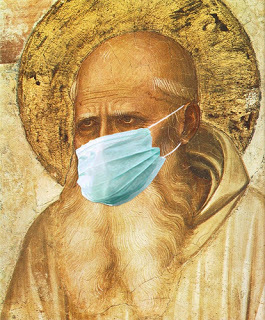
I’m no moral theologian…though I play one in the classroom. I’m also not a doctor. But I am most definitely a Catholic. So…while I expect vigorous debate among theologians, authorities and scientists, when it comes to issues like vaccination, I rely primarily on 1. Obedience and 2. Scientific consensus. Bearing that in mind:
1. If it is immoral to take this vaccine, then it’s on the bishops. They will be accountable to God. But the vast, vast, vast majority of them agree that it is okay to take this vaccine. So I’ll take it. You really can’t be more Catholic than the combined offices of the Catholic bishops plus the pope. If you pretend to be, then I think you need to question whether you are truly Catholic. (I’m saying “you” in general).
2. I strongly suspect it is more dangerous to avoid taking this vaccine. The vast, vast, vast majority of scientist believe it’s safer to take it than not to take it. So I’ll take it. Because I’m not a better scientist than the combined resources of the Mayo Clinic, Johns-Hopkins, the FDA, and virtually every government health organization in the world.
For me, therefore, it boils down to humility. I’m not smarter and wiser than all those folks combined. Granted, they may still be wrong. The argument from authority is not proof. But it carries a lot of weight in my book.
It also carries a lot of weight in my book! (Ha! Ha! Get it? Because I wrote a book on humility. Oh man…)
November 8, 2020
Being There
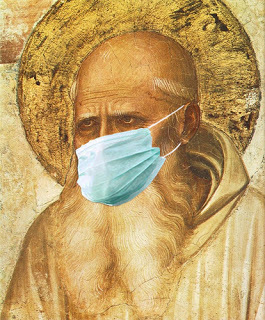
Mt 25:1-25
(The Parable of the Wise and Foolish Virgins)
Sunday Nov. 7 homily to the Passionist Nuns of Saint Louis...and mass attendees
I was intending to read you some more stories from the lives of the Desert Fathers, but all week, my friends have been making apocalyptic prophecies, and this morning at 2am, I woke up thinking about them and decided to preach on that topic instead. So if my sermon sounds like the sort of thing you would worry about in the middle of the night, you know why.
The key insight of our Gospel parable is this: that GOD WILL COME TO US—BUT WE HAVE TO BE READY. Our salvation is assured, so long as we show up—and stay awake long enough to notice.
Easy enough.
Well, in theory it is.
For those of you who have had to sit around waiting for me to show up for mass, you understand that there are some among us for whom merely showing up is itself a struggle. Twice already, I’ve failed to show up for mass here at the Passionists—and even when I do show up, I’m usually late. My mother used to tell me, “You’ll be late for your own funeral” and it turns out she was speaking prophecy because as a priest, I’ve been late to several of my funerals.
A few years ago, the father of one of my students asked to meet with me because she was worried. “I drag my son, kicking and screaming to mass every Sunday, but he hates it. When we get there, he slumps down in the pew like a convict and acts like he’s sleeping. I wonder whether it’s even worth it, you know. After all,” he said, “you can lead a horse to water, but you can’t make it drink.” I thought about what he was saying. He had a really valid point; and I for one, could understand his frustration. But here’s what I told him: “It is true that you cannot make the horse drink. But if you don’t lead that horse to the water, you can be certain it never will.”
We are not saved by faith alone. We are saved as part of a community of believers. And to be part of the community, we need to show up, because you can’t have a relationship with someone who isn’t there. The foolish virgins of the parable learned this lesson the hard way. And if I may be a little bold here, I think perhaps we as Catholics have been a little too eager to skip mass on Sunday in favor of playing it Covid safe. If Mass on Sunday is the single most important thing we do all week, and we haven’t been doing that, then maybe we shouldn’t be doing anything.
Anything at all.
Ever.
I realize I may be preaching to the choir here. (Actually, come to think of it, I am, literally, preaching to the choir.) But again, it seems to me that if we really believed this was the incarnate son of God visiting us in the flesh…we’d be willing to risk everything. But instead, we closed the doors of our churches.
Now, it’s easy for me to say, because I’m not in charge. The bishops know more than I do, and they say we can stay home if we’re scared of dying. But I was under the impression that we come to Sunday Mass every week on pain of our immortal souls—and that, as far as canon law goes, there are only two exceptions: if we are actually physically sick or if we are traveling…BY OXCART.
And this is why Sunday mass is worth the risk. Because this is the time we assemble as a community—as a complete community—to pray. And more than that: because at this prayer, we offer Jesus as our sacrifice, and Jesus is perfect, which means this is the only perfect prayer we have to offer. So even if we look bored or half-asleep…or even if we look completely asleep. Even if we don’t want to be here in the first place, we come, because it is a well of grace. A fountain of grace. A spring of living water. We come here to drink.
And that’s all we need to do. Show up and drink. Personally, I find that to be an enormous consolation. This thing we’re doing here—it’s goodness, it’s trueness, it’s merit—doesn’t depend on my eloquence or holiness or good judgment. In fact, it doesn’t depend on anything we think or do. I believe this with all my heart. Jesus does all the work here. And speaking as one who fails time and time again to love people the way I should, I see this as the greatest of God’s gifts to me. This Eucharist will be truly, sublimely good…precisely because it doesn’t depend on me.
As I was writing this homily, I was reminded of a story my sister told me long ago about one of her children. She has two daughters (at the time, they were four and six) and she noticed that the younger of the two would whisper to herself during the consecration at mass. So she started listening very carefully, and discovered, to her dismay, that when the priest would lean over the host and say, “This is my body,” Mary would say, “Mmmm, no it isn’t.” And when he’d say the words, “This is the cup of my blood,” she’d say, “Uhhhh, no it’s not.”
So my sister spent the next several days trying to explain to her the Catholic doctrine of transubstantion. She wasn’t entirely convinced that she had succeed (and how could she have? It took Thomas Aquinas five volumes, and he was writing for adults); but then there was an ecumenical prayer service at Mary’s preschool (a “non-religious” prayer service actually, if I remember the details correctly. How such a thing is even possible, only God knows…) And afterwards, my sister asked her how it went. Mary thought for a minute and said, “Well, Mom, it was OK. But you know, Jesus wasn’t there.” It turns out, she was correcting the priest. That was Jesus’ body, not Father’s! For all her lack of sophistication regarding sacramental theology, this child did have a sense of what Cardinal Ratzinger called “the dimension of the sacred in the liturgy.”
How exactly we will recover this dimension of the sacred is up to you, I think. No doubt, it will entail a return to the catechism, a return to the scriptures, and a return, in a special way to Mass on Sunday. But for now, I’ll simply leave you with a quote. It’s from a book by a monk named Gregory Dix. He wrote it in 1951, and his description of the mass one of the most beautiful ever written:
“ For century after century,” he writes, “spreading slowly to every continent and country and among every race on earth, this action has been done, in every conceivable human circumstance, for every conceivable human need from infancy and before it to extreme old age and after it, from the pinnacle of earthly greatness to the refuge of fugitives in the caves and dens of the earth. Men have found no better thing than this to do for kings at their crowning and for criminals going to the scaffold; for armies in triumph or for a bride and bridegroom in a little country church; .... for the wisdom of the government of a mighty nation or for a sick old woman afraid to die;… because the Turk was at the gates of Vienna…for the settlement of a strike; for a son for a barren woman; for Captain so-and-so wounded and prisoner of war; while the lions roared in the nearby amphitheatre; on the beach at Dunkirk; tremulously, by an old monk on the fiftieth anniversary of his vows; furtively, by an exiled bishop who had hewn timber all day in a prison camp near Murmansk; gorgeously, for the canonisation of S. Joan of Arc—one could fill many pages with the reasons why men have done this, and not tell a hundredth part of them. And best of all, week by week and month by month, on a hundred thousand successive Sundays, faithfully, unfailingly, across all the parishes of Christendom, the pastors have done this just to make the plebs sancta Dei—the holy common people of God.”
NOTE: But for God’s sake, take reasonable precautions. Wear a mask, even if you don’t believe it is very effective. If nothing else, think of it as an act of charity—to make the people around you feel more at ease. And if you’re going to receive communion on the tongue, kneel to receive it…otherwise, you often wind up licking the priest’s finger, which is just plane gross.
October 27, 2020
Sermon to the Alliance of the Two Hearts On the Occasion of their Pro-Life Novena
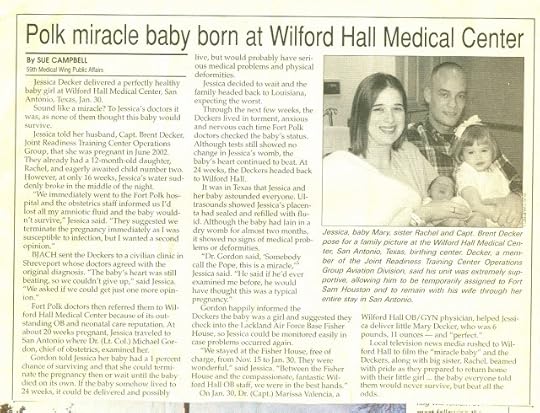
Firstly, I didn’t know when I agreed to come preach today that I would have to preach on the passage about submissive wives. Lucky for me, I’m not married. Don’t have a dog in that fight. So I’ll just mention in passing that any time you are inclined to look at a passage of scripture and dismiss it as obsolete, then you need to take a much longer, much more thorough, far more honest look at that passage, because all Scripture is true. Every single line. Either you’re hiding from the truth or your misinterpreting it. So…what does Saint Paul really mean when he says, “wives should be subordinate to their husbands”? I’m not getting in the middle of that one. Not why I’m here tonight. You’ll have to figure it out for yourselves.
THE FUTURE
In 2005, Philip Tetlock, a psychologist at the University of Pennsylvania, completed a twenty-year study on predictions. “Tetlock interviewed 284 people who made their living “commenting or offering advice on political and economic trends.” He asked them to assess the probabilities that certain events would occur in the not too distant future, both in areas of the world in which they specialized and in regions about which they had less knowledge. Would Gorbachev be ousted in a coup? Would the United States go to war in the Persian Gulf? Which country would become the next big emerging market? In all, Tetlock gathered more than 80,000 predictions. Respondents were asked to rate the probabilities of three alternative outcomes in every case: the persistence of the status quo, more of something such as political freedom or economic growth, or less of that
thing.
“The results were devastating. The experts performed worse than they would have if they had simply assigned equal probabilities to each of the three potential outcomes. In other words, people who spend their time, and earn their living, studying a particular topic produce poorer predictions than dart-throwing monkeys who would have distributed their choices evenly over the options. Even in the region they knew best, experts were not significantly better than nonspecialists.” (Thinking Fast. Thinking Slow, Daniel Kahneman)
The reason I’m starting my homily with this disconcerting lesson in human error is because I’ve spent the last several weeks making my own predictions: when a vaccine will be found, what will happen if so-and-so gets elected, whether or not we’ll get a supreme court justice, where the next riot will break out…what will happen to my senior Theology students if they don’t start turning in their blasted homework…. None of this makes me feel any better. Yet I keep doing it, because in “these uncertain times” making confident predictions about the future calms me. Admittedly, the calm doesn’t last long. I know deep down that human predictions are about as dependable as dart-throwing monkeys—and perhaps more dangerous.
Our gospel this evening offers a prediction of a different sort: The Kingdom of God is at hand. And we are to spread out through that kingdom like yeast in dough while Christ himself gently, quietly, imperceptibly transforms it. And herein lies the difference between prediction and prophecy: that the first puts frail and fallible humans in charge of our future, while the second entrusts that future to God. It’s very similar to the difference between magic and miracle; it’s a question of where we put our trust.
We’re a part of it. But we’re not in charge of it. God expects us to be faithful, not successful. And that’s what happens when you submit in humble docility to God’s will: you get peace and joy—but not necessarily comfort or happiness. “If I did not simply live from one moment to another,” wrote Saint Therese of Liseux, “it would be impossible for me to be patient, but I look only at the present, I forget the past, and I take good care not to forestall the future.”
ABORTION
Last week, in an interview with Elle Magazine, Sen. Gary Peters, claimed in an interview with Elle magazine that his then-wife (He has a new wife now, of course.) underwent an abortion 30 years ago and she nearly died "based on politics."
In the late 1980s Peters' then-wife Heidi was in the fourth month of her pregnancy when her water broke, leaving the baby without amniotic fluid. The doctor recommended an abortion because he said the child had no chance at survival, but hospital policy prohibited the procedure.
"The doctor told her the situation was dire," the Elle story said. "She could lose her uterus in a matter of hours if she wasn't able to have an abortion, and if she became septic from the uterine infection, she could die."
To make a long story short, Peters' wife got to another hospital and had the abortion. "If it weren't for urgent and critical medical care, I could have lost my life," Peters' former wife said.
I’d like to counter that with a very similar story. It will never get the sort of circulation that Elle Magazine has, but maybe you can tell it to someone some day. My friend is married with three kids. About seventeen years ago, and sixteen weeks pregnant, her water broke. Ultrasound revealed that the amniotic sac had completely ruptured, that there was no more fluid around the baby. She was told that she would go into labor within the next forty-eight hours, and that there looked to be amniotic bands within the womb. These pieces of tissue would begin to wrap around the baby's limbs and amputate them. She was sent home after a two day hospital stay with instructions to return weekly to have an ultrasound so that they’d know when the baby was dead. Weeks passed and still she had not gone into labor. At this point the doctors became adamant that she should—in the chillingly antiseptic language of the business—“terminating the pregnancy.” The diagnosis was that the baby, they told her, was severely mentally and physically handicapped , would be born with no lungs. A second doctor informed her that there was a less than 1% chance of the baby's survival She also said that the baby had severe club feet. The doctor said to her, and I quote, "You have a moral duty to finish what God has started." Five different doctors told her to "terminate" the pregnancy. They told her that this child was a threat to her life. What's more, they assured her that the child was already mentally and physically worthless. Even if it could be brought to term, they assured her. It would die in her arms. Even if it could survive delivery, it would be crippled and profoundly retarded. "Have an abortion." they told her. One doctor even set up an appointment for her against her wishes. "Do it now," this doctor said, taking her by the arm, "Put a period at the end of this sentence." So much for pro-choice.
When my friend broke the news to her husband, this is what he said: "How lucky for this child that she would be born into a family which could love her for who she is! What better family than ours to raise a disabled child?" I tell you, that is the kind of courage that deserves an award. I told my friend, if your husband leaves toilet seat up for the rest of his life, let it go, because he has earned it.
For two months, my friend lived with the knowledge that she would, at best, bear a child who would die in her arms. She decided to name the child Mary. In the meantime, she prayed, her husband prayed, and Rachel, Mary’s older sister, she prayed too. She didn’t entirely understand what was going on, but she knew her sister was in trouble, and I wonder sometimes if perhaps it was the profound innocence of her prayers that reached into the great well of God’s grace and extracted a miracle. I 25th week of her pregnancy another ultrasound revealed something extraordinary. "We need to call the Pope” said the doctor, "not only has the amniotic sack resealed itself, but all the fluid has returned." He called in all the interns, all the nurses, the assistants, random people standing the hallway. The amniotic bands had disappeared. The baby was in perfect health.
By now, a few of you will have guessed that I’m talking about my sister. Jessica Decker is her name, and Mary Decker, the Miracle Baby, is now an eighteen-year-old honor student at John Paul II Prep with a 4.2 GPA and has her heart set on being a pediatric surgeon.
In closing, I’m going to give you a homework assignment. A provocative, controversial homework assignment: but probably not controversial the way you’re expecting. I’m going to ask you to do something that’s going to make you uncomfortable. The Carmelites here are doing battle one-on-one with Satan right here in the cloister, but if you want to be part of this fight, then you’re going to have to be willing to be that leaven that Jesus was talking about in the Gospel—to go out into the world, mix in with the dough, and quietly cause the bread to rise. And in preparation for that, I want you to go onto Planned Parenthood’s web site, and find something you agree with.
Now I’m not suggesting that you open your heart to evil. Make no mistake: Planned Parenthood is a genocidal, racist, bastion of evil. But I am not convinced that everyone who supports Planned Parenthood understands this. And the next time you wind up in a conversation with one of these people, I want you to be able to say to them something along the lines of, “You know, I was on the Planned Parenthood web site the other day, and I thought they got this exactly right.” And maybe—just maybe—they will then visit a Pro-Life web site and find something they agree with. And maybe—just maybe—if we don’t dismiss them offhand as murderous, godless barbarians, they won’t dismiss us offhand as closed-minded, bible-thumping rubes. But we have to model for them the behavior we want to see. As hard as it is, we have to come to them with open hearts. And maybe--just maybe--there will be an alliance of two hearts that we never expected.



